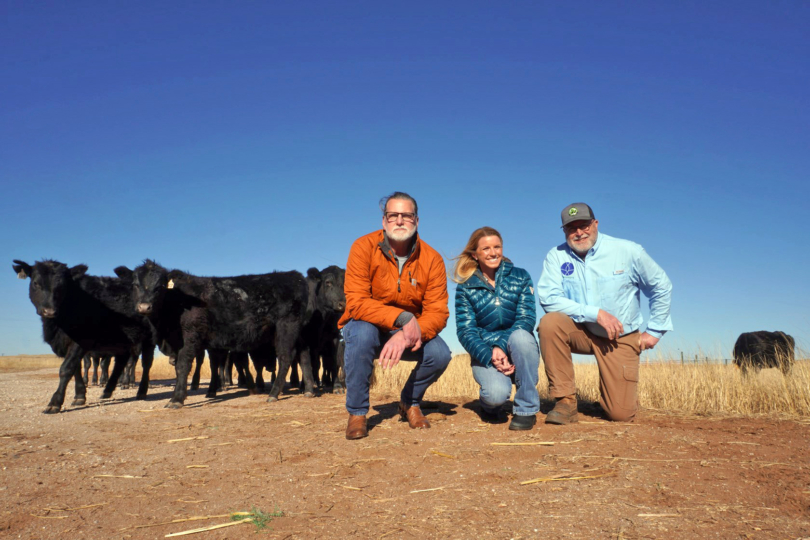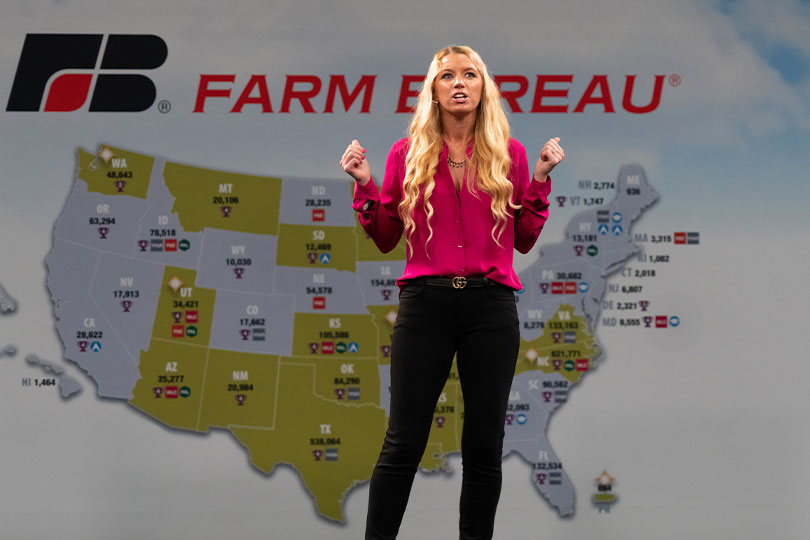By Emmy Powell
Communications Specialist
A Texas startup, EmGenisys Inc., was named runner-up in the national Ag Innovation Challenge, thanks to the company’s non-invasive analysis of embryo morphokinetic activity to improve pregnancy outcomes of assisted reproductive techniques in livestock.
The 2023 Farm Bureau Ag Innovation Challenge seeks to identify top entrepreneurs working to address challenges faced by America’s farmers, ranchers and rural communities. The challenge provides opportunities for Farm Bureau members to showcase business innovations being developed for agriculture.
As the runner-up, EmGenisys received $20,000, along with an additional $10,000 for qualifying as one of the top 10 semi-finalist teams and an additional $5,000 for advancing to the final four.
“We are thrilled to be first runner-up at the Ag Innovation Challenge,” Cara Wells, founder and CEO of EmGenisys, said. “Overall, the experience was surreal. As someone who’s passionate about agriculture, seeing the opportunity and growth potential in this entire industry, it’s really cool that we were featured as a company that can really make good positive change to bring out profitability to American cattle producers and cattle producers worldwide.”
EmGenisys is an animal health company that aims to improve the production economics and sustainability of livestock production.
“Twenty percent of embryos that get transferred into recipients are non-viable at time of transfer. The human eye cannot identify these embryos. They have no chance of establishing a pregnancy and are a financial drain to the producers,” Wells said. “Our technology scans embryos and is 85-95% accurate at identifying those non-viable embryos prior to transfer. Once they’re identified, people can elect to not transfer them, discard them or use them in some other capacity.”
The company’s flagship product is a Software as a Service (SaaS) solution offering a non-invasive analysis of embryos before transfer.
The software can be used with a smartphone and a microscope.
The user records 30-second videos of embryos in culture. The software analysis evaluates the videos frame-by-frame to scan each embryo for signs of life. Embryos are ranked so the veterinarian or embryologist can select to transfer only healthy embryos and improve pregnancy outcomes.
It allows producers to know if the embryo is alive at transfer, so they do not spend time and money transferring non-viable embryos.
“By making sure that every embryo is alive and healthy at time of transfer, pregnancy rates improve,” Wells said. “Because we’re not transferring the non-viable or dead embryos that don’t have a chance, we’re making sure every recipient has a good, verified viable embryo.”
When using the program, pregnancy rates improve up to 20%.
Although veterinarians or embryologists are the users, producers benefit the most, Wells said.
“They bear the economic burden of failed pregnancy,” she said. “We have a dichotomous customer segment, where those technically-inclined individuals are the user and the direct customer, but we’re benefiting the farms at the producer level.”
The startup seeks to help make animal production more efficient and sustainable and is working to get rid of limitations within the industry.
“The way that people evaluate embryo health hasn’t changed in over 40 years. We’ve had a lot of progress in animal genetics and nutrition,” Wells said. “IVF and embryo transfer has really played a huge role in creating the industry and herds that we have today. But the way that we evaluate embryo health hasn’t changed since the 1980s. So, we’ve created the first non-invasive and objective methods to evaluate the embryo’s health, which can be done in the lab or on the farm.”
The computer-based technology can see details the human eye and brain cannot, so it allows the user to look at advanced parameters of the embryo’s development in real time to evaluate its health.
Among the many challenges agriculture faces, one is rural veterinarian retention.
“If we can give veterinarians technologies that reduces the physical labor that they have to do and gives them a revenue stream as they can sell these technologies to their clients, it helps improve their profitability and reduces labor they have to do to improve the health of their clients’ animals,” she said.

Wells works alongside a team to develop and utilize the technology.
Russell Killingsworth is co-founder and chief veterinary officer for EmGenisys. He’s a veterinarian who practices embryo transfer in the Texas Panhandle. Tracy Druce is chair of the board and an intellectual property attorney. Wells, Killingsworth and Druce are the founding team and work alongside additional employees with various backgrounds.
The startup competed for the Ag Innovation Challenge Award during the American Farm Bureau Federation Annual Convention in January. During the convention, $15,000 was awarded to two finalist teams, $20,000 to the runner-up and $50,000 to the winner. An additional $5,000 was awarded to the People’s Choice Team, which was decided by public vote.
“The start-up companies we’re recognizing today are committed to helping rural communities and supporting farmers and ranchers in their mission to provide the food, fuel and fiber we all rely on,” AFBF President Zippy Duvall said. “The four finalists are all impressive, and I am confident that they are going to succeed. More broadly, the innovative solutions developed by these entrepreneurs are helping shape the future of agriculture.”
The Ag Innovation Challenge was evaluated by a three-person judging panel: Ricardo Fernandez, president and CEO, Puerto Rico Farm Credit; George Gough, policy and advocacy programs manager, Bayer CropScience; and Patricia Ramírez, collaborator, Grupo Guayacán Inc.
AFBF recognized these innovative businesses, in partnership with sponsors Farm Credit, Bayer Crop Science, John Deere, Farm Bureau Bank and Farm Bureau Financial Services.
Learn more about EmGenisys at EmGenisys.co.
Applications are now being accepted for the 2024 Ag Innovation Challenge. Learn more at fb.org/challenge.

